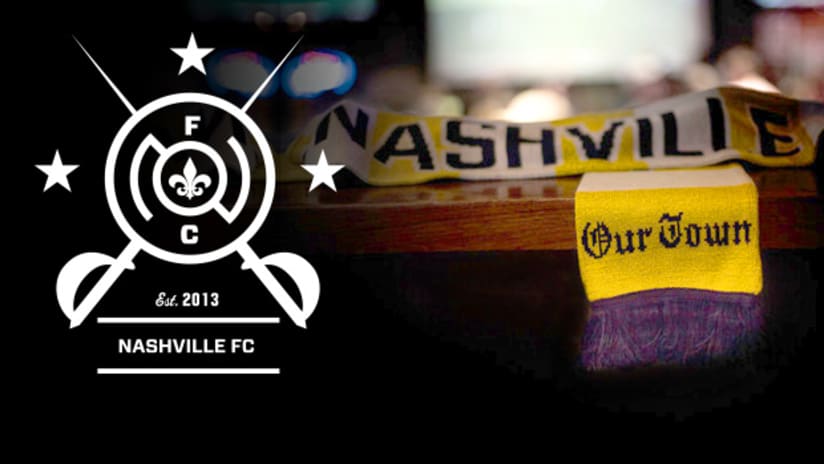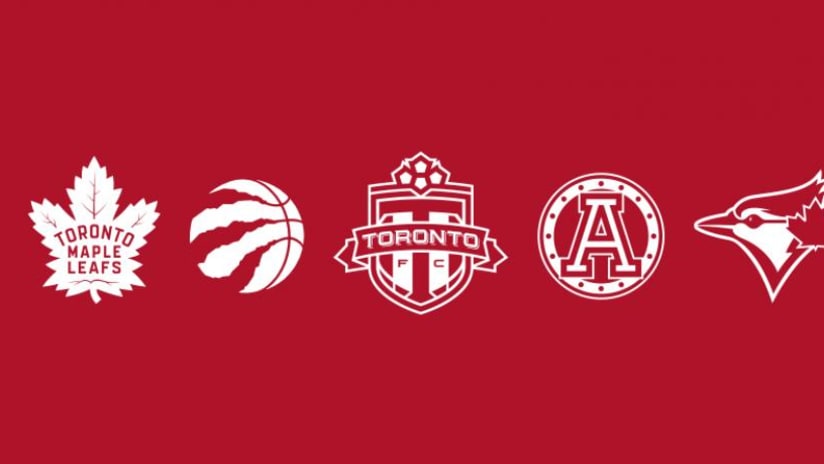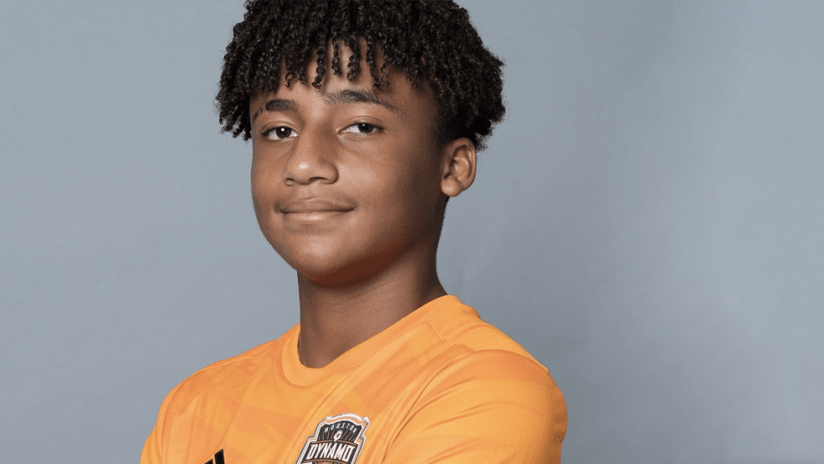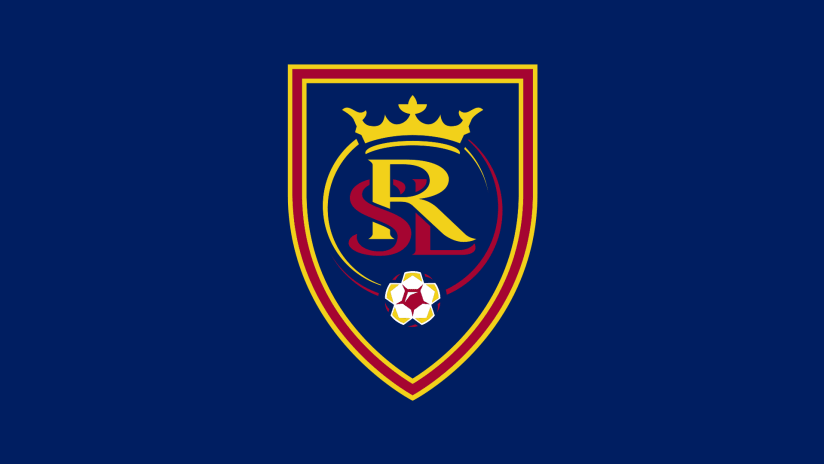THE WORD is MLSsoccer.com's regular long-form series focusing on the biggest topics and most intriguing personalities in North American soccer. This week, managing editor Jonah Freedman offers a look at the first fully supporter-owned soccer club in the United States, in perhaps the least likely of places: Nashville, Tenn. Created one night by two buddies over drinks, the team now has a head coach, freshly minted jerseys, stadium plans in place and – beginning in May – a league to conquer, just like any other team in the country.
It all started as most good ideas generally do – over a beer.
Well, a root beer. But the notion was a sweet one: Why couldn’t an American soccer club be 100 percent supporter-owned, much in the way FC Barcelona or Boca Juniors are? Why couldn’t fans in the States put their passion directly into the club nearest their hearts?
And most crucially in this era of big business in sports when it’s all about the bottom line, why couldn’t the fans have control over their team’s fate? Why couldn’t they make it impossible for balance sheet-obsessed owners to threaten to move their team to another city?
Two young professionals in Nashville had that very thought on their minds last May. They weren’t soccer nuts, per se. But like most Nashvillians, their Music City pride ran deep, as did their love of their local sports teams. And that pride had taken a small hit.
Barely three months earlier, the local soccer team, the Nashville Metros – until then, the longest-running continuously operating team in the United Soccer Leagues – abruptly folded after years of ownership issues and rumors of relocating elsewhere.
To fill the void, a 31-year-old former college football player named Chris Jones had a crazy idea he thought might actually work.
“I had been mulling this for a couple years,” explains Jones, a credit specialist who found himself drawn to the TV to watch Chelsea matches religiously on weekends. “I thought, this is how the Green Bay Packers are run – how could we do that here in Nashville?”
That night, over burgers and root beer at an upscale local watering hole, Jones and fellow sports enthusiast Robby Johnston hatched a plan with huge dreams and daring details. And unlike a lot of good ideas dreamed up in a bar, this one actually came to fruition:
Nashville FC, the first fully supporter-owned soccer club in the United States.
It wasn’t much at first. Jones told Johnston about a crest he mocked up years ago on Microsoft Paint. Johnston suggested the names of some local media personalities they could get on board with the idea. Both agreed a Facebook page and a Twitter account was the first step.
Fast-forward to today, and they’ve raised thousands of dollars, attracted some 200 members across 23 states and five countries, folded in a powerful local adults’ rec club, secured a dozen corporate sponsors, won the backing of the local government and have a potential overseas partner in 2008 FA Cup champions Portsmouth FC on speed dial.
In May, they’ll take the field as team in the National Premier Soccer League (NPSL), beginning in earnest as an amateur club with big ambitions. But that’s just the start. By the end of the decade, they envision themselves playing in a former Triple-A baseball stadium as a USL PRO team and partnering with an MLS club.
And it all started with two simple tweets.
–-
Want to own part of a soccer team? You don’t have to go overseas to become an owner of Nashville FC.
Here’s how it works: For a pledge of $75, you can become a “founder,” with the right to vote on all major club decisions. You also get an exclusive founders scarf and free admission to all home games. If that’s too much commitment, you still get an ownership stake and voting privileges for just $40.
You can donate more, of course. In fact, you could be a multi-millionaire willing to pony up a fat check to support Nashville FC’s efforts. But like everyone else, you still get a one-year membership, and a single vote on major club decisions.
That’s the model Jones and his partners put together, and it became the baseline business model for Nashville FC. They borrowed parts of it from what they learned from the Green Bay Packers (whose ownership is divided into shares) and took other elements from some of world soccer’s superclubs whose ownership structures are entirely or partially supporter-based.
The hope was that the organization – founded as a non-for-profit – would collect enough memberships to pay the $10,000 entry fee into the fourth-division NPSL, and begin play as an amateur club by May of 2014.
Founded in 2003, the NPSL is considered the fourth division of the U.S. Soccer pyramid, along with the USL Premier Development League. It has undergone impressive growth in the past decade, rocketing from six teams at its inception to a current tally of 78 clubs across 13 divisions nationwide.
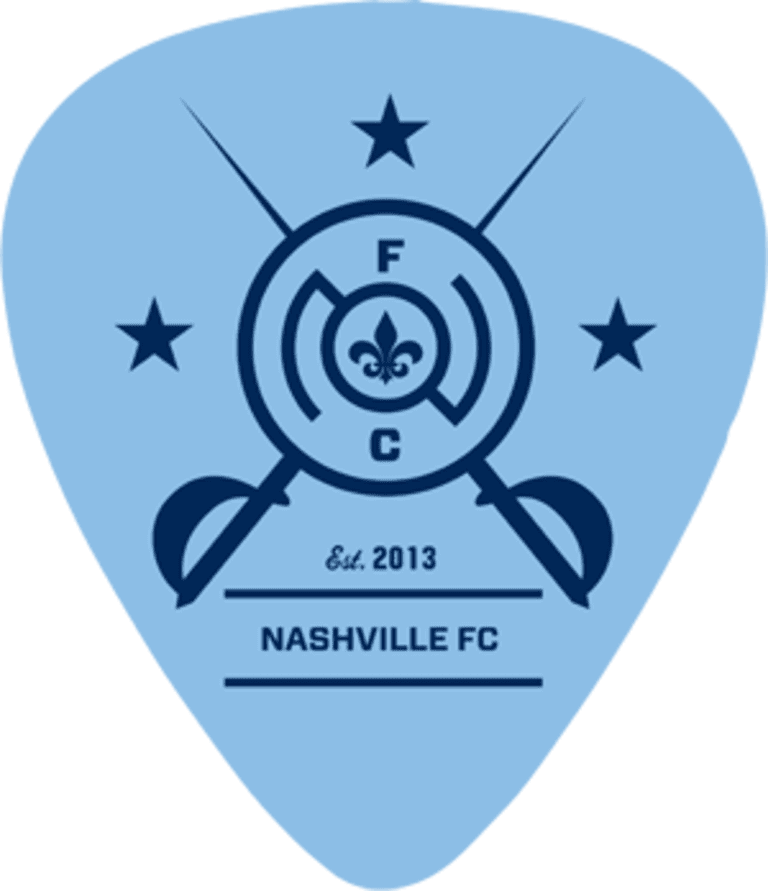
Attendance numbers across the league are expectedly modest, but
Detroit City FC
average more than 1,200 fans per game, an ideal indicator that even a small club can connect with its community, according to NPSL commissioner Michael Hitchcock.
And for Nasvhille, joining the NPSL made good financial sense. Slotting into a conference with teams in Chattanooga, Knoxville and across the Alabama state line in Huntsville and Birmingham – even two teams in Atlanta – made for easy road trips. (The defunct Metros, who also played in the USL PDL, had to travel further to face opponents in Florida, South Carolina and Virginia, which contributed to their financial problems.)
In the meantime, Jones used his lunch hours and weekends to try to make as many contacts as he could in Nashville’s “divided and cliquish” soccer scene, as he puts it, to give him credibility. That ranged from directors of youth clubs, decision-makers in local rec leagues and soccer alliances, coaches and athletic directors at local colleges.
And it worked. Nashville FC’s aggressive social media efforts were attracting a good amount of local buzz as the membership raced toward the first-year goal of 150 “founder” members. Talks with local businesses were fruitful, and large corporations such as energy conglomerate Delek Holdings and Pepsico climbed aboard as sponsors. Others, like Nashville-based Yazoo Brewery, verbally committed to the cause.
Meanwhile, the conversations with the NPSL were positive. The Nashville FC group pitched their unique business model to Hitchcock, who shared it with the more than 70 club owners who – somewhat similarly to Nashville FC’s structure – comprise the ownership of the league.
“I saw the potential of the model and strategy,” says Hitchcock, who served as FC Dallas’ general manager from 2006-09. “Our mission [at the NPSL] is to grow the sport of soccer in a sustainable way. That lends itself to groups like theirs. Other groups had come to us in the past with the [supporter-owned] concept. But no one ever executed as well as Chris had done in a relatively short time.”
There was just one problem: Someone had beaten them to the finish line. In November, Jones and his partners learned the NPSL had already awarded the Nashville metro franchise rights to another group.
–-
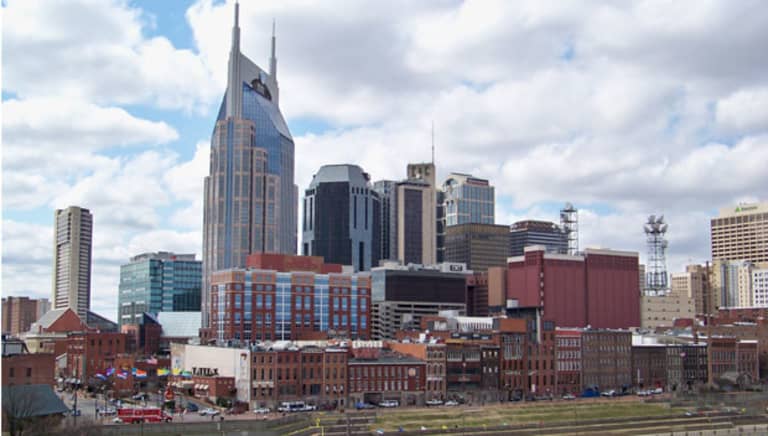
Nashville has a metro population of roughly 1.7 million, and has doubled its foreign-born residents over the past decade.
(Photo by Getty Images)
–-
Despite the Metros’ run of more than two decades in operation, Nashville isn’t a classic soccer hotbed. Only four area universities have Division I programs (just two of those have men’s teams), and the metro area hasn’t produced many locally raised products.
In fact, you’re more likely to hear about US Under-17 national team prospect Tanner Dieterich than the most accomplished local son, former MLS All-Star goalkeeper Henry Ring.
But Nashville does have a healthy youth soccer scene, with some 10 large-scale youth clubs in the metro area and participation rates that number near 20,000 kids.
It also has a booming economy. Among metropolitan areas in the United States with more than 1 million residents, Nashville is in the top 10 in population growth over the past decade, according to US Census Bureau data. It also had the fastest rate of job growth in 2012, and trailed only Houston and Tampa in 2013, according to the US Bureau of Labor Statistics.
Central Tennessee’s reasonable real estate prices and tax rates have attracted a handful of US-based conglomerates to shift large portions of their operations to the Nashville area. Culturally, it remains a healthy mecca for country musicians, and the local NFL and NHL franchises continue to draw strong attendance numbers.
There are also encouraging, soccer-friendly demographics to consider. Nasvhille’s Latino population (10 percent, according to the 2012 US Census) is holding steady with the city’s growth, and a recent study by demographer Wendell Cox revealed that Nashville has more than doubled its number of foreign-born residents in the past decade, the fastest rate for any city in the nation. The city is now home to the largest Kurdish population outside Iraq and “growing Mexican, Somali and other immigrant enclaves,” according to the study.
U.S. Soccer has also taken notice of Music City’s boom, with the US men’s and women’s national teams playing two games apiece over the past five years in front of healthy crowds at LP Field, home of the Tennessee Titans. Caleb Porter's ill-fated men’s Under-23 team also played all three of its games there in its Olympic qualifying campaign in 2012, a disastrous but nonetheless memorable moment in Nashville soccer history.
But with a metro population of roughly 1.7 million – making it the 30th-biggest market in the US – Nashville isn’t so big that rumblings of a movement like Nashville FC can go unnoticed by the watchful eyes of the local soccer scene.
One of those people who took interest quickly was Nolan Pittman, a former player at Nashville’s Belmont University and coach with area youth club Tennessee United. Pittman was also in charge of Atlas FC, an adult rec club with competitive teams in Middle Tennessee’s largest competitive adult league and with roots deep in the state’s soccer association.
Pittman was also heading up his own efforts to put Atlas in the NPSL. And very early in that process, he heard about Nashville FC’s bid and realized he had a serious rival in the race.
“People call it the biggest small town in the country,” he laughs. “Sometimes you feel like it’s Mayberry because everybody knows everything about everybody. In that way, it was inevitable Nashville FC and Atlas would come into contact.”
What Atlas had over Nashville FC was more experienced soccer people in the fold. And more importantly, they had money. Pittman and his group were able to pony up the $10,000 expansion fee and the $4,000 franchise fee in fairly short order. In November, the NPSL awarded Nashville Atlas FC entry into the league for the 2014 season.
Jones was crushed. Not only was Nashville FC beaten to the punch, but because of the NPSL’s franchise rules, Nashville Atlas FC also won the right to operate exclusively as the league’s entrant in Nashville, with a 30-mile radius of territory rights.
“It was disappointing,” he says. “The NPSL had been so positive about what we were doing and told us they believed in our model. The explanation I got at the time was that they felt they owed it to Atlas to give them a year to establish themselves.”
Hitchcock echoes that reasoning, and discloses that Nashville FC and Atlas were actually two of four groups bidding for the Nashville marketplace. But the commissioner says the explanation was even simpler than that.
“[Atlas] presented well; they checked all the boxes,” he says. “Chris at that time, because the model was so different, he didn’t have the financing in order. But Nolan did. We suggested they talk to each other.”
–-
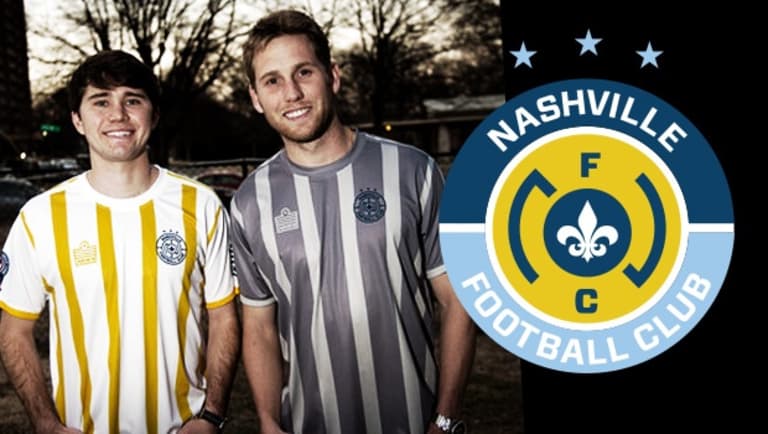
The official crest of Nashville FC is made to resemble a record, honoring Nashville's reputation as Music City. The colors are taken form the City of Nashville flag, and the fleur de lis is taken from the city seal.
(Photo and logo courtesy of Nashville FC)
–-
That wasn’t as easy as a simple sit-down. Pittman, who holds an MBA from Vanderbilt, had heavy skepticism about Nashville FC’s business model. Jones, meanwhile, says there were “reputational concerns” about Atlas that he declines to disclose.
Eventually, the two sides agreed to sit down because the other had something of value to bring to the table. Atlas had the franchise rights and soccer people. Nashville FC, meanwhile, had attracted the attention of the mayor’s office thanks to an even crazier idea.
With the support of one of their wealthier sponsors, Jones and Nashville FC vice president Cameron Eades came up with a proposal that was far bigger than anything they had imagined at the outset of the adventure: Repurpose a soon-to-be-vacant minor-league baseball stadium into a centerpiece of an urban development center.
It was wildly ambitious. In December, the Nashville City Council approved a $37 million plan for a new stadium across town for the Nashville Sounds, the Milwaukee Brewers’ Triple-A affiliate. That meant that the Sounds’ current home, Herschel Greer Stadium, could be vacant by next year.
Jones and Eades suggested that perhaps Nashville FC and the city could find a way to reconfigure Greer into a soccer-specific stadium, much the way Portland did with Providence Park ahead of the Timbers’ MLS debut. It would be owned and operated by Mapco, a local subsidiary of Delek Holdings that runs a chain of convenience stores in Tennessee.
And with a permanent home that could potentially seat as many as 15,000, with proposed youth fields and commercial developments nearby, the fourth division was no longer a limitation.
“We were suggesting a rise to USL PRO,” Jones says, “and perhaps an affiliation with an MLS club that would create a big domino effect. From there, Greer could even host national team games or college tournaments.”
Jones was asked to present the plan to a mayoral commission in December, and says the response was a positive one. The city officials didn’t just pledge to help once the proposal became more concrete, they bought founder memberships in Nashville FC. Jones walked out of the meeting minus a few scarves.
That civic interest was a powerful tool in convincing Atlas to hammer out their differences with Nashville FC, Pittman admits.
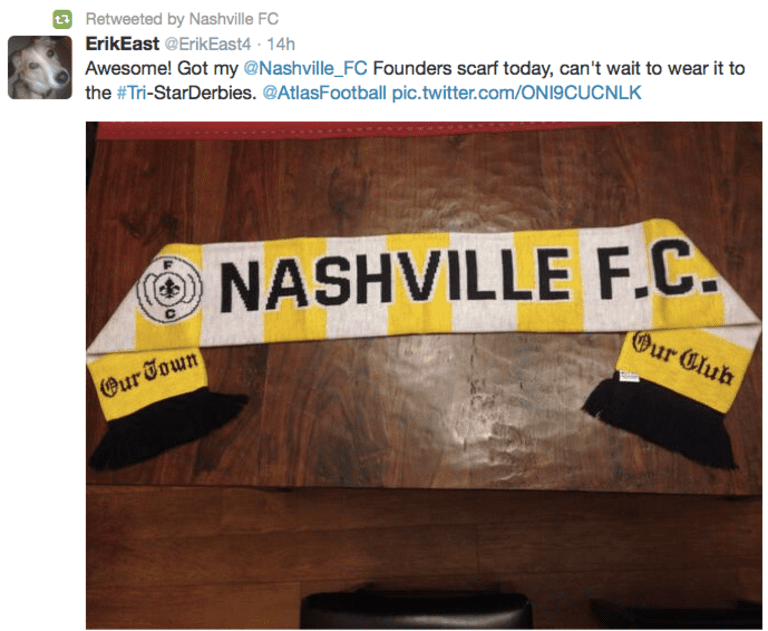
“It was contentious for about 60 days,” he says. “We were born out of a bunch of men’s teams we put together. We had a team on the ground and kept moving up the chain in terms of competition. Their idea was more fan-based to get a team back here after the demise of the Metros. Once we looked past that and saw an opportunity to get together and hammer out our differences, we realized our collective visions were the same.”
The details were still the hang-up. Jones and his group weren’t budging from Nashville FC’s core mission statement.
“I said before we got started, ‘If our model is not 100 percent community-owned and run, I am not interested,’” Jones says of their early meetings in December. “They assured me they were fine on the concept. They just had questions on how to execute and operate it.”
The compromise became obvious. If the overarching philosophy was to do what was best for Nashville, the groups knew they had to pool their resources. And the more Pittman looked at Nashville FC’s business model, with the new potential to scale up in the future, the more he thought it could work.
“I realized, this is a sustainable model,” he says. “More so than one large owner who gets tired of writing checks or decides he wants to move on to a different team. That’s where you get a lot of the power. No one person has the power to say, ‘I’m done and I’m leaving.’”
From there, the negotiations moved swiftly. Nashville FC’s directors agreed to take Pittman and the operating names of Atlas onto their board. They also chose to extend the “founders” cap to 200 members to accommodate Atlas’ members.
The two merged their youth efforts, with an eye on setting up a full pyramid of youth and adult teams under the Nashville FC name. They combined their local efforts to scout for talent with try-outs and exchanged their findings. They agreed to make their first-team head coach a man named Bryan Johnson, a local coaching veteran with connections to the biggest collegiate programs in the South.
And with the combined resources of both factions, Nashville FC had a healthy budget of cash in the bank that would get them through the scalable demands of an NPSL season.
With the backing of the league, Nashville FC’s goal of fielding a team in time for the 2014 season became real as the merged clubs forged ahead together, greater than the sum of their parts. In many ways, their bridge-building was a sign the damage done by the Metros would never be repeated.
“I think they create a terrific team,” says Hitchcock. “Their strengths and weaknesses complement each other. That’s what’s so nice – sometimes it doesn’t come together. But here are two passionate guys who realize they’ll do it better together.”
–-
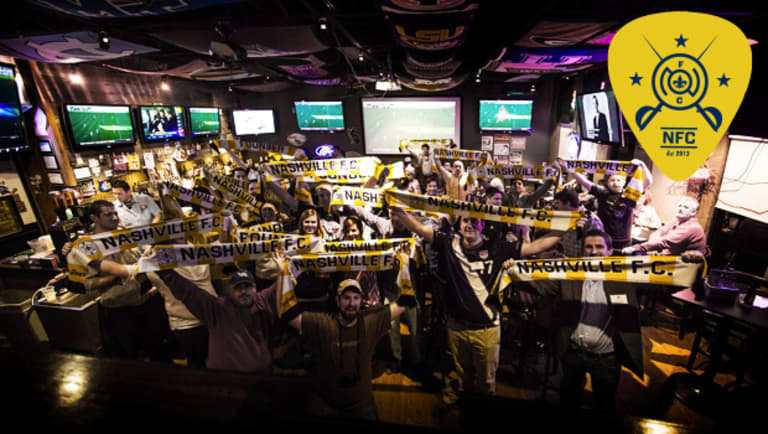
The Nasvhille FC-Atlas merger was announced officially earlier this month, and the club will open its 12-game 2014 NPSL schedule at regional rivals Knoxville Force on May 10. Its home opener is May 24 vs. the Atlanta Silverbacks Reserves.
(Photo and logo courtesy of Nashville FC)
–-
On February 1, the US national team was 2,000 miles away in Los Angeles. But for the 100 fans who packed Jed’s Sports Bar & Grille, just blocks from the campus of Vanderbilt University, it was as if the USMNT’s friendly victory over South Korea was a mere opening act.
That afternoon was when the Nashville FC-Atlas merger was announced officially to the public in a brief presentation before the game and at halftime.
Jones and Pittman both spoke, appearing for the first time as a unified voice. Johnson was there, along with his two assistant coaches who were both introduced for the first time. A 2014 stadium deal was imminent, Jones announced, at what is “a premier soccer-specific field in Nashville.” And the club’s official jerseys – with a blue-and-gold color scheme to match the city flag – were unveiled to cheers from the crowd.
“That night we signed another 16 members,” Jones beams. “That’s over $1,000 right there. The support behind the merger has been really cool. Everyone you can think of is coming out of the woodwork to join us. Two supporters groups have already formed.”
Perhaps the best part of the event came when the club's 2014 NPSL schedule was displayed in a presentation to the fans in attendance. All of them booed at the May 17 date at Chattanooga FC, Nashville’s closest geographical rivals.
That’s the moment it really came to life for Jones.
“It was amazing,” he recalls. “When we had the [first] tryout, it was the pinch-me moment where you think, ‘This is actually happening.’ But that day was when you could really start seeing it – the supporters all holding their scarves and screaming obscenities at some of the teams on the schedule.”
The suds flowing that day at Jed’s was certainly not of the sugary, non-alcoholic variety like that evening last spring. But it was a sweet moment to behold. In less than a year, the dream to mobilize Nashville to support its own soccer team – “Not just a team in Nashville, but Nashville’s team,” as Pittman puts it – has come to life.
It’s so crazy, it’s going to work.

